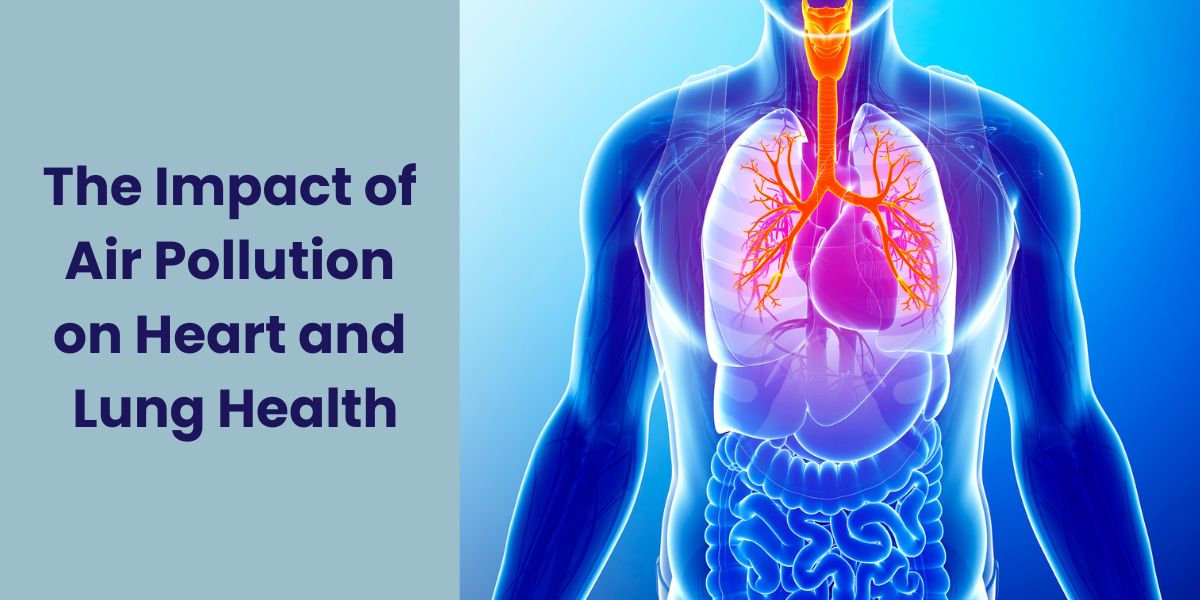Air pollution has become an invisible enemy affecting millions across the globe, particularly in urban and industrial areas. While most people associate it with respiratory issues, the harmful effects of polluted air extend beyond the lungs to damage the heart and overall cardiovascular system. According to Dr. Girish Kirad, a trusted internal medicine doctor, understanding how air pollution impacts heart and lung health is crucial for preventing chronic diseases and maintaining a healthy life.
Understanding Air Pollution
Air pollution is a mix of harmful substances in the air we breathe. It includes particulate matter (PM2.5 and PM10), nitrogen dioxide (NO₂), sulfur dioxide (SO₂), carbon monoxide (CO), and ground-level ozone (O₃). These pollutants are primarily emitted from vehicles, factories, construction activities, and the burning of fossil fuels. Indoor pollution from cooking stoves, tobacco smoke, and household chemicals also contributes significantly, especially in densely populated areas.
How Air Pollution Affects Lung Health
1. Increased Risk of Asthma and COPD
Pollutants like PM2.5 irritate the airways, leading to inflammation, bronchospasm, and mucus overproduction. This increases the risk of developing chronic respiratory conditions such as asthma and Chronic Obstructive Pulmonary Disease (COPD). In people already living with asthma, pollution can trigger frequent and severe attacks.
2. Reduced Lung Function
Long-term exposure to air pollution can cause progressive damage to lung tissues, reducing their capacity to expand and contract. Children exposed to polluted air from a young age often experience impaired lung development, which may lead to lifelong respiratory issues.
3. Increased Respiratory Infections
Polluted air weakens the body’s natural defense mechanisms, making the lungs more susceptible to infections like bronchitis and pneumonia. People living in polluted areas often report chronic cough, wheezing, and breathlessness.
How Air Pollution Impacts Heart Health
While the link between pollution and lung diseases is well-established, research now shows that air pollution significantly increases the risk of heart diseases as well.
1. Elevated Blood Pressure
Inhaled pollutants cause systemic inflammation and oxidative stress, which can lead to stiffening of blood vessels and increased blood pressure. Over time, this damages the arteries and increases the risk of heart attacks and strokes.
2. Increased Risk of Heart Attacks
Airborne particles can enter the bloodstream through the lungs, leading to clot formation and plaque buildup in arteries. This can block blood flow to the heart, resulting in heart attacks, especially in people with existing heart disease.
3. Worsening of Pre-existing Heart Conditions
For people with heart failure or coronary artery disease, pollution can worsen symptoms and increase hospitalizations. Even short-term exposure to high pollution levels can trigger serious cardiac events.
Vulnerable Populations
Certain groups are more vulnerable to the harmful effects of air pollution:
Children: Their lungs are still developing and they breathe faster, taking in more pollutants.
Elderly: Aging weakens the immune system and respiratory function.
People with existing heart or lung diseases: Such as asthma, COPD, or hypertension.
Pregnant women: Pollution exposure is linked to premature births and low birth weight.
Recognizing the Symptoms
Common symptoms caused or worsened by air pollution include:
Persistent cough
Shortness of breath
Wheezing
Chest tightness or pain
Fatigue
Irregular heartbeat
If you or your loved ones experience these symptoms frequently, it’s important to seek medical advice.
Asthma and Pollution: What You Need to Know
Asthma is one of the most common chronic diseases linked to air pollution. Exposure to vehicle exhaust, smoke, and industrial emissions can worsen asthma symptoms and increase the frequency of attacks. Common triggers in polluted environments include:
Ozone and nitrogen dioxide
Dust and pollen combined with pollutants
Indoor pollutants like incense and aerosol sprays
If you are looking for Asthma Treatment in Chandan Nagar, timely diagnosis and personalized care are essential. With the right medical guidance, lifestyle changes, and medications, asthma can be effectively managed—even in polluted environments.
Protecting Your Heart and Lungs from Pollution
While we can’t eliminate air pollution completely, we can take steps to reduce its impact on our health:
Check Air Quality Index (AQI): Avoid outdoor activities on days when the AQI is high, especially during early mornings or late evenings when pollution peaks.
Use Air Purifiers: Install HEPA filters in your home to clean indoor air.
Wear N95 Masks: Especially in high-traffic areas or during smog episodes.
Improve Ventilation: Avoid smoking indoors and use exhaust fans in kitchens.
Stay Hydrated and Eat Antioxidant-Rich Foods: Help your body combat the oxidative stress caused by pollution.
Follow Medical Advice: People with asthma or heart conditions should strictly follow their treatment plans and keep emergency medication handy.
Air pollution is a silent but significant threat to both lung and heart health. It aggravates chronic respiratory conditions, increases the risk of cardiovascular diseases, and can shorten life expectancy. However, with greater awareness, timely intervention, and expert care, its impact can be minimized. Dr. Girish Kirad offers comprehensive guidance and support for individuals seeking effective Asthma Treatment in Chandan Nagar, helping patients lead healthier, more comfortable lives—even in today’s polluted environment.


